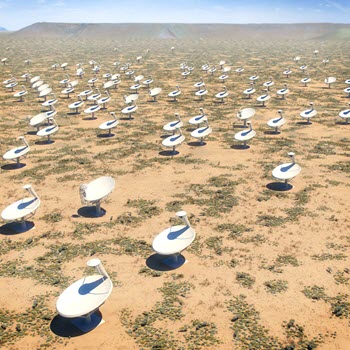AWS News Blog
New – AstroCompute in the Cloud Grants Program
|
|
The skills and techniques needed to create, store, process, and manage data sets that start in the hundreds of gigabytes and grow to multiple terabyte size are all too rare. It is time to change that!
We have teamed up with the Square Kilometre Array (SKA) to create the new AstroCompute in the Cloud grant program in order to address these “to infinity and beyond” sorts of problems in order to ensure that mature, high-quality data management and processing solutions are in place by the time the SKA starts to pump out data in 2020 or so.
What’s the SKA?
 I should start with a quick introduction to the SKA. It is funded by 11 world governments—with more planning to join—and will have a physical footprint in South Africa and Australia. The site in South Africa will be home to a set of high and mid frequency dish antennas (200 to start, with plans to grow to 2000 over time, spread across eight other African countries). The site in Australia will host 125,000 low frequency dipole antennas at the start, growing to a total of one million by the late 2020’s. These antennas will allow astronomers to monitor the sky in unprecedented detail and to run whole-sky surveys far faster than any system currently in existence. The goal is to address—and hopefully tackle—some of the most fundamental questions about our universe.
I should start with a quick introduction to the SKA. It is funded by 11 world governments—with more planning to join—and will have a physical footprint in South Africa and Australia. The site in South Africa will be home to a set of high and mid frequency dish antennas (200 to start, with plans to grow to 2000 over time, spread across eight other African countries). The site in Australia will host 125,000 low frequency dipole antennas at the start, growing to a total of one million by the late 2020’s. These antennas will allow astronomers to monitor the sky in unprecedented detail and to run whole-sky surveys far faster than any system currently in existence. The goal is to address—and hopefully tackle—some of the most fundamental questions about our universe.
All of this raw data (exabytes per day at full scale) will be distilled down to a far more manageable level (exabytes per year) for storage and analysis. The distillation (filtering, calibration, geometric transformation, and more; see the SKA’s Software and Computing page for more information) is the big challenge that we want to address with these grants.
AstroCompute Grants
The next step is the target of the grants program that I am sharing with you today. The AWS Scientific Computing group, along with our friends at the SKA, want to make sure that the rest of the world is ready to process this astronomical (sorry) amount of data when it starts to become available in 2020.
To this end, we are providing grants (AWS credits) and up to one petabyte of storage for an AWS Public Data Set. The data set will be initially provided by several of the SKA’s precursor telescopes including CSIRO’s ASKAP, the MWA in Australia, and KAT-7 (pathfinder to the SKA precursor telescope Meerkat) in South Africa. These telescopes have already seen first light and are now producing data. Over time, the data set will grow to the full petabyte using data provided by the other SKA partners. The grants are open to anyone who is making use of radio astronomical telescopes or radio astronomical data resources around the world.
The grants will be administered by the SKA. They will be looking for innovating, cloud-based algorithms and tools that will be able to handle and process this never ending data stream. You can also read their post on Seeing Stars Through the Cloud.
If you meet the basic qualifications listed above, have an interest in working on this problem, and would like to apply for a grant, please visit the Call for Proposals page.
— Jeff;
